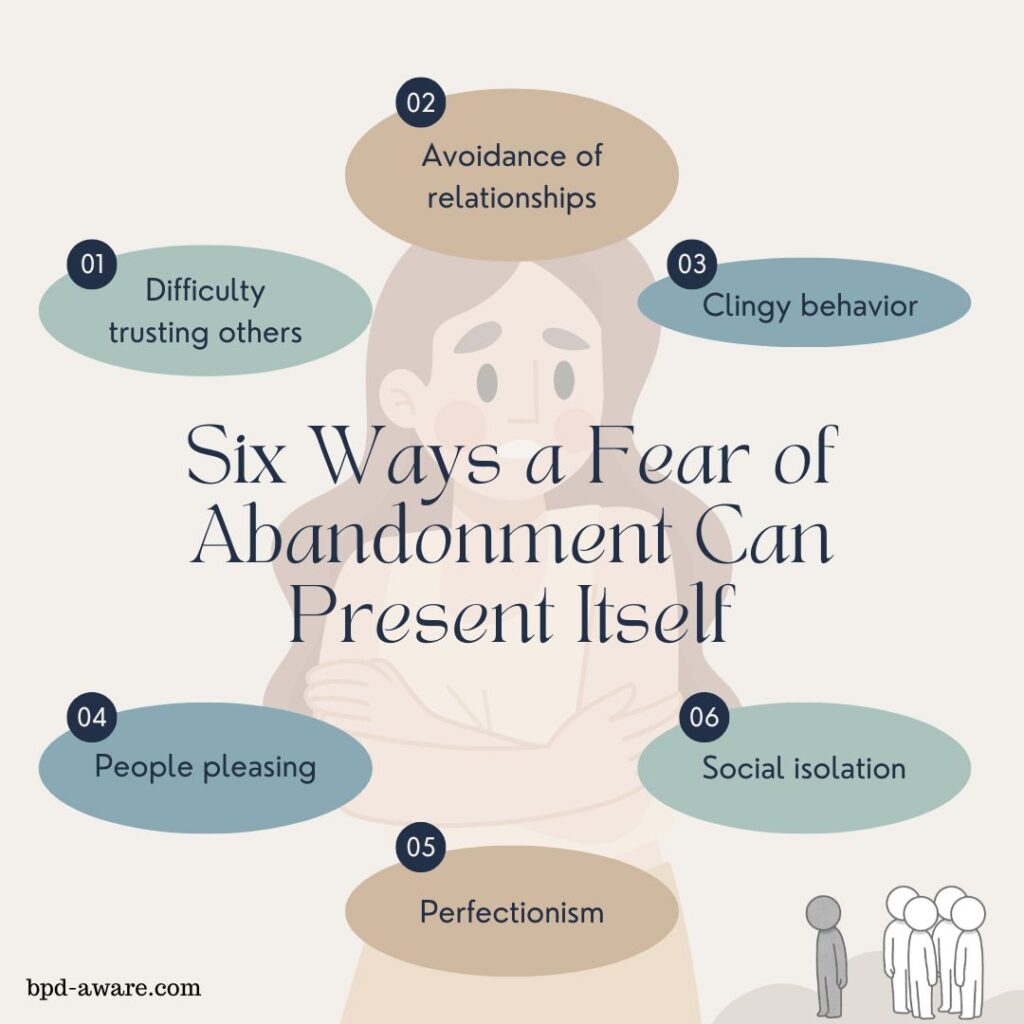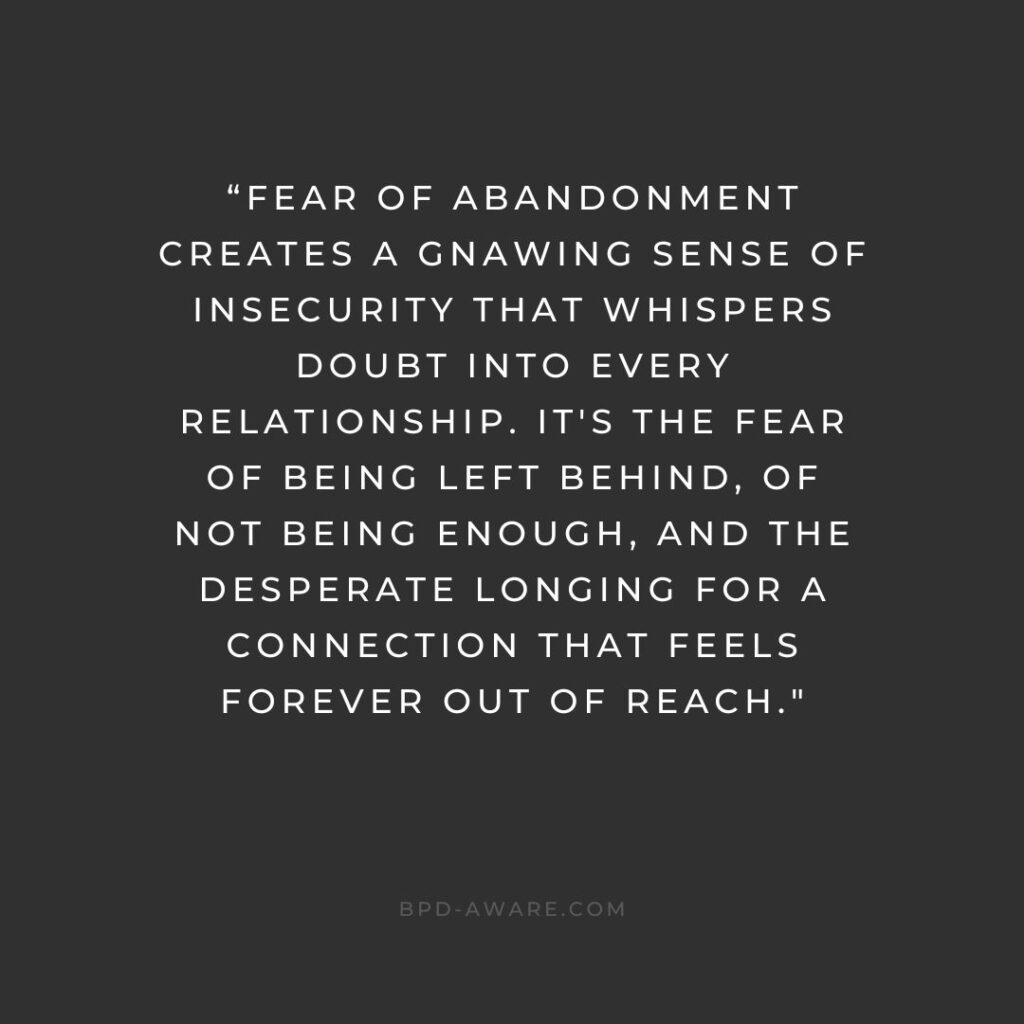To be diagnosed with Borderline Personality Disorder (BPD) you need to suffer from at least five of the nine core symptoms. These symptoms include an unstable sense of image and difficulty regulating emotions. One of the most pervasive of these symptoms is a fear of abandonment.
To a certain extent, most of us have a fear of abandonment. No one wants to lose people they love. However, people with BPD experience a fear of abandonment so powerful that it can overwhelm them most of the time. It takes over their thought patterns and behavior to the point that it prevents them from developing healthy relationships. This makes relationships of all kinds more likely to crumble, causing a cycle of broken relationships that only worsens the issue.
The Origins of a Fear of Abandonment
There are two main forms of abandonment – physical and emotional. Physical abandonment is the more obvious of the two. In physical abandonment, someone has physically left the scene. This could be someone ending a relationship or they may have died. Emotional abandonment is less obviously dramatic but can be just as damaging. Emotional abandonment involves someone being neglectful of someone else’s emotional needs.
It’s generally believed that a fear of abandonment develops quite early in life, typically due to some form of childhood trauma. Childhood trauma comes in many forms including neglect, sexual abuse, physical abuse, emotional abuse, exposure to domestic violence, bullying, and traumatic separation (such as the death of a parental figure).
While it’s easy to understand how the death of a close family member can lead to a fear of abandonment, other childhood traumas can be a cause too. An unhealthy childhood leads to maladapted patterns of thinking and behavior. For example, a child who got bullied at school may have a fear of abandonment that makes it hard for the grown adult to trust that others genuinely care for them and aren’t just setting them up to be a victim again.
It also needs to be noted that fear of abandonment doesn’t necessarily come from childhood trauma. It can develop in adolescence or even in adult life. It seems natural that someone who suffers through an especially bad relationship or the break-up of what seemed like a great relationship might develop a fear of abandonment. This is only amplified with more relationships that fall into these categories.
As R.D. Laing once said, “Insanity is a perfectly rational adjustment to an insane world.” With the pain and suffering that comes through these experiences, someone’s thought patterns might begin to change in several ways. This includes a fear of abandonment and Borderline Personality Disorder.
How Fear of Abandonment Manifests in People With BPD
A fear of abandonment can manifest itself in many ways:
Avoidant behaviors: Some people with a fear of abandonment may avoid forming close relationships, withdraw from social situations, or refuse to open up on an emotional level. This means any relationships formed will likely be one-sided and shallow. People with avoidant characteristics often feel lonely and misunderstood. This is often true of people with Discouraged BPD.
Dependency: A fear of abandonment can make people be seen as “clingy” or “overly needy”. The person becomes completely reliant on their friend, family member, or partner for their sense of self-esteem and identity. This is commonly seen in the “favorite person” phenomenon in BPD.
Difficulty trusting others: It can be exceedingly difficult to trust others when you’re constantly concerned that they will abandon or betray you. This, again, creates shallow relationships that rarely last – further compounding the fear of abandonment.
Low self-esteem: Many of those with a fear of abandonment have low self-esteem and feel unworthy of living a good life. They may believe that they’re unlovable or broken in some way that can’t be fixed.
Jealousy and possessiveness: A fear of abandonment can create feelings of jealousy and possessiveness in relationships. If the person sees a friend talking to someone else, this can cause them to react extremely negatively due to the fear they’re going to be “replaced”. If these concerns are voiced, particularly in an abrasive manner, it can fracture the relationship.
Difficulty with boundaries: Healthy boundaries are vital for any successful relationship but this is another area where people with a fear of abandonment may struggle. They may attempt to become overly entangled with their partner or push them away to avoid being hurt.
Emotional instability: Fear of abandonment creates a lot of anxiety within the sufferer. This in turn leads to emotional instability and mood swings as the person is often left feeling emotionally raw and on edge.
Overtly abusive behavior: Someone with a fear of abandonment may belittle and demean their partner to lower their self-esteem so that they begin to believe that no one else will ever love them. In more extreme cases this can even extend to physical and/or sexual abuse.

The Impact of a Fear of Abandonment
As we’ve seen, a fear of abandonment can manifest itself in many different ways. This is also true of the impact it can have. Someone with BPD and a fear of abandonment may have several shallow relationships with no real closeness that leaves them feeling alone in the world.
Another individual with abandonment fear may enjoy the honeymoon period of a romantic relationship and then implode and break it off because it becomes too emotionally intense and personal for them to handle.
Those whose abandonment fear manifests in jealousy and possessiveness are likely to eventually cause people to leave them due to the continued negativity, further compounding their fears.
There are many other ways fear of abandonment can impact a relationship and none of them are good. A strong romantic relationship or friendship with the right partner may solve many of the problems but it’s more likely that abandonment fear will ruin relationships and push good people away. This leaves people with abandonment issues open to predators and other toxic relationships.
The impact of abandonment fear doesn’t just affect the sufferer either; it affects everyone they’re in a relationship with. A toxic relationship can cause serious mental health problems for both parties. Hurt people hurt people, as the saying goes.

Healing From a Fear of Abandonment
So far I’ve painted a bleak picture of abandonment fears. However, there is some good news. You can heal and recover from a fear of abandonment. It takes time and work but it can be done. And several options can help when you have BPD and a fear of abandonment.
Therapy: Therapy comes in many forms but two of the best for healing and overcoming a fear of abandonment are Dialectical Behavior Therapy (DBT) and Schema Therapy (ST) – both of which are also incredibly successful in treating Borderline Personality Disorder.
One of the modules in DBT teaches interpersonal effectiveness skills which helps people learn how to build strong, healthy relationships. Individuals will learn how to cope with distressing situations which can help with feelings of jealousy or emotional instability.
In Schema Therapy, individuals work with their therapist to identify problematic thoughts and behavior and where these may have sprung from. They are taught healthy coping mechanisms and behaviors to replace the negative ones.
Other therapeutic options help help with a fear of abandonment such as Cognitive Behavioral Therapy and Attachment Therapy.
Mindfulness: Mindfulness teaches how to stay grounded in the present and reduce anxieties about the future and all the unknowns it brings. Mindfulness can come in many forms but some of the most popular ones include meditation, yoga, journaling, and fishing.
Building Healthy Coping Mechanisms: Healthy coping mechanisms give us a positive outlet for unhealthy thoughts and feelings. Journaling can be a very useful coping technique as it gives us a chance to write down our true thoughts and feelings without being judged. Keeping a journal also helps us to learn our patterns of behavior and triggers. Other healthy coping mechanisms include exercise, creative expression, and distractions such as reading or watching a movie.
Establishing Healthy Boundaries in Relationships: Setting certain boundaries can make relationships more stable and secure. Both sides are entitled to set boundaries, which should be discussed and agreed upon beforehand. A clear understanding of acceptable behaviors in a relationship can reduce mistrust and fear of abandonment. Couples therapy can also help to strengthen a relationship.
Final Thoughts
The fear of abandonment affects many people with Borderline Personality Disorder and makes it incredibly difficult to engage in healthy relationships. This fear often comes from childhood trauma but can come about due to poor relationship experiences later in life.
Fear of abandonment can ruin relationships and creates a self-perpetuating cycle, making the fear increasingly worse over time. This can lead to people shutting themselves off from others entirely, which itself can lead to loneliness, depression, paranoia, and a whole host of other mental health problems.
Fortunately, it is possible to reduce and overcome fears of abandonment. There are many ways to work on this fear, including therapy, mindfulness, developing healthy coping mechanisms, and establishing healthy boundaries in relationships. While we always recommend therapy, we recognize that not everyone wishes to enter therapy or can necessarily afford it. However, therapy does incorporate all these tools and more.
The important thing to note is that a fear of abandonment is not a life sentence. You can make a recovery a live a life full of healthy, meaningful relationships.
Sources, Resources, and Further Reading
- Reviewing the clinical significance of ‘fear of abandonment’ in borderline personality disorder: https://pubmed.ncbi.nlm.nih.gov/30403145/
- Why do People with BPD Have a Fear of Abandonment?: https://riveroakspsychology.com/why-do-people-with-bpd-have-a-fear-of-abandonment/
- Understanding Fear of Abandonment: https://www.verywellmind.com/fear-of-abandonment-2671741
- 5 Ways to Heal a Fear of Abandonment: https://www.crackliffe.com/words/2022/7/14/how-to-heal-fear-of-abandonment
- Abandonment Anxiety: How to Understand and Overcome Your Fear: https://psychcentral.com/health/fear-of-abandonment
















